

On bullshit. Happy Birthday, Brain Pickings: 7 Things I Learned in 7 Years of Reading, Writing, and Living. By Maria Popova Reflections on how to keep the center solid as you continue to evolve.

UPDATE: The fine folks of Holstee have turned these seven learnings into a gorgeous letterpress poster inspired by mid-century children’s book illustration. On October 23, 2006, I sent a short email to a few friends at work — one of the four jobs I held while paying my way through college — with the subject line “brain pickings,” announcing my intention to start a weekly digest featuring five stimulating things to learn about each week, from a breakthrough in neuroscience to a timeless piece of poetry. “It should take no more than 4 minutes (hopefully much less) to read,” I promised. Liberalism & Conservatism.
Dr.
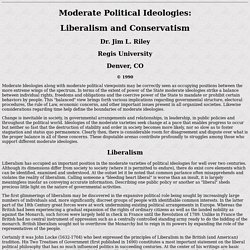
Jim L. Riley Regis University Denver, CO. Heterarchy. A heterarchy is a system of organization where the elements of the organization are unranked (non-hierarchical) or where they possess the potential to be ranked a number of different ways.[1] Definitions of the term vary among the disciplines: in social and information sciences, heterarchies are networks of elements in which each element shares the same "horizontal" position of power and authority, each playing a theoretically equal role.
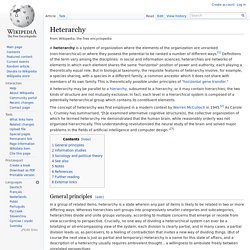
But in biological taxonomy, the requisite features of heterarchy involve, for example, a species sharing, with a species in a different family, a common ancestor which it does not share with members of its own family. BBC Radio 4 - A History of Ideas - Episode guide. Simone Weil. Simone Weil (French: [simɔn vɛj]; 3 February 1909 – 24 August 1943) was a French philosopher, Christian mystic, and political activist.
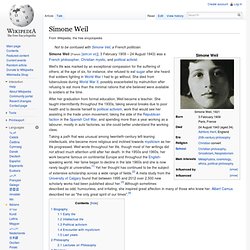
Weil's life was marked by an exceptional compassion for the suffering of others; at the age of six, for instance, she refused to eat sugar after she heard that soldiers fighting in World War I had to go without. She died from tuberculosis during World War II, possibly exacerbated by malnutrition after refusing to eat more than the minimal rations that she believed were available to soldiers at the time. Taking a path that was unusual among twentieth-century left-leaning intellectuals, she became more religious and inclined towards mysticism as her life progressed. Weil wrote throughout her life, though most of her writings did not attract much attention until after her death.
In the 1950s and 1960s, her work became famous on continental Europe and throughout the English-speaking world. Biography[edit] Introduction to Political Philosophy. About the Course This course is intended as an introduction to political philosophy as seen through an examination of some of the major texts and thinkers of the Western political tradition. Three broad themes that are central to understanding political life are focused upon: the polis experience (Plato, Aristotle), the sovereign state (Machiavelli, Hobbes), constitutional government (Locke), and democracy (Rousseau, Tocqueville).
The way in which different political philosophies have given expression to various forms of political institutions and our ways of life are examined throughout the course. View class sessions » Course Structure This Yale College course, taught on campus twice per week for 50 minutes, was videotaped for Open Yale Courses in Fall 2006. The Open Yale Courses Series. Political philosophy. Exploring. Anarchism and Taoism. Anarchism is usually considered a recent, Western phenomenon, but its roots reach deep in the ancient civilizations of the East.
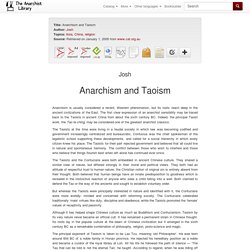
The first clear expression of an anarchist sensibility may be traced back to the Taoists in ancient China from about the sixth century BC. Indeed, the principal Taoist work, the Tao te ching, may be considered one of the greatest anarchist classics. The Taoists at the time were living in a feudal society in which law was becoming codified and government increasingly centralized and bureaucratic. Anarchism and Other Essays: Anarchism: What It Really Stands For. Pierre-Joseph Proudhon. Francesc Ferrer i Guàrdia. Francesc Ferrer i Guàrdia (10 January 1859 – 13 October 1909)[1] (known as Francisco Ferrer y Guardia in Spanish and often simply as Francisco Ferrer) was a Spanish anarchist.
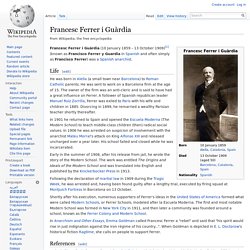
Life[edit] William Godwin. Early life and education[edit]
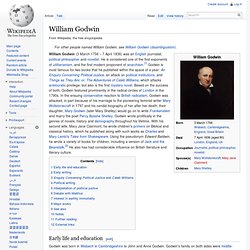
Anarchism. The central tendency of anarchism as a social movement has been represented by anarcho-communism and anarcho-syndicalism, with individualist anarchism being primarily a literary phenomenon[25] which nevertheless did have an impact on the bigger currents[26] and individualists have also participated in large anarchist organisations.[27][28] Many anarchists oppose all forms of aggression, supporting self-defense or non-violence (anarcho-pacifism),[29][30] while others have supported the use of some coercive measures, including violent revolution and propaganda of the deed, on the path to an anarchist society.[31] Etymology and terminology[edit] The term anarchism is a compound word composed from the word anarchy and the suffix -ism,[32] themselves derived respectively from the Greek ἀναρχία, i.e. anarchy[33][34][35] (from ἄναρχος, anarchos, meaning "one without rulers";[36] from the privative prefix ἀν- (an-, i.e.
"without") + ἀρχός, archos, i.e. History[edit]